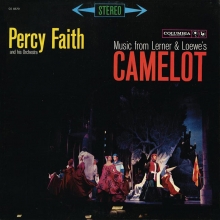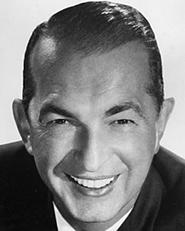Camelot
Availability
Lp (mono): Columbia CL 1570 (USA)
Lp (stereo): Columbia CS 8370 (USA)
CD: Collectables COL-5832 (2-on-1 with My Fair Lady) (USA)
About This Album
Recorded in Los Angeles, October 25-27, 1960.
Cover photo: Milton H. Green. Some pressings credit Friedman-Abeles.
NOTE: The cover and liner notes were altered for later pressings.
Liner notes
Camelot, the fabulous new musical by Alan Jay Lerner and Frederick Loewe, takes its title from King Arthur’s legendary castle in the dawn of chivalry. Broadway’s greatest new hit unfurls the glittering pageantry of Arthur’s court in a dazzling blend of music and movement. Brave knights languish for their lovely ladies between jousting tournaments, Merlin weaves his magical spells, and Camelot bursts into melodious life once more. Mr. Lerner and Mr. Loewe are the gifted artists who created My Fair Lady, which received virtually every award the theatre has to offer, both here and abroad, and Gigi, which won nine Academy Awards. Earlier, their score from Brigadoon collected many honors. The sunny fields and dark forests of Camelot are a long way from Eliza Doolittle’s Covent Garden or Gigi’s Paris boulevards, but they have inspired the composers to a shimmering blend of medieval beauty and medieval lustiness. Book, music and lyrics are fused in an enchanting re-creation of an ageless legend. And as Percy Faith’s sumptuous arrangements of the music demonstrate, Camelot’s score has a vibrant life of its own, off-stage as well.
The story deals with the ill-starred romance between Queen Guenevere (or Jenny, as she is called in the play) and Sir Lancelot. Richard Burton makes his musical debut as King Arthur, and Julie Andrews, the incomparable star of My Fair Lady, portrays his Jenny. Sir Lancelot is played by Robert Goulet, a young radio star from Canada, and others in the cast are Roddy McDowall, Robert Coote and M’el Dowd. Mr. Lerner’s book and lyrics are based not on the sentimental Tennyson version of the tale, but on the witty and irreverent novel, The Once and Future King, by T. H. White.
The scope of the story, with its brilliant court scenes, country revels and mystical forests, offers Mr. Loewe an opportunity for some of his loveliest music. The rousing March, the bustling title song and the zestful The Lusty Month of May are among his sprightliest compositions. Among the ballads are the tender How to Handle a Woman, the bittersweet I Loved You Once in Silence and the haunting Follow Me. To all of these, and to the other charming songs in this collection, Percy Faith brings the special distinction of his suave arrangements, painting an orchestral portrait of Camelot to rank with his best-selling My Fair Lady. The valedictory of Mr. White’s novel is not the conventional “The End,” but “The Beginning.” This has a special meaning in the book, but with their matchless craftsmanship, Alan Jay Lerner and Frederick Loewe have expanded that meaning and given Camelot a shining musical future.

